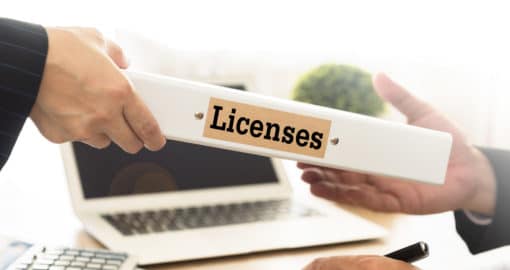Call Us Today (877) 943-0100
9 Best Practices for Monitoring Licenses for Contractors and Vendor Networks
License Monitoring | December 7, 2020
If you have ever found yourself in a position where a job was unknowingly completed by an unlicensed contractor in your network, then you know how quickly everything can spin out of control. In today’s gig economy and internet recruiting, unlicensed contractors are more common because anyone can create a business and claim they are capable of completing the work with no regard to the industries’ license requirements.
Previously, the contract language and the Contractual Indemnification Clause, compliance to local and state license requirements was wholly with the contractor. In many cases, holding the appropriate trade licenses was on the honor system. However, regulatory and licensing boards are now going after the larger companies who dispatch the unlicensed contractors with threats of aiding and abetting unlicensed contractors as well as negligent hiring. This is why monitoring licenses for contractors is absolutely critical.
Accurately determining which licenses are required for the work being performed, ensuring the license remains in good standing, and enforcing the requirements with your network are critical if you want to see any real impact from license tracking and monitoring. When done right, you know that you will have a higher quality network of contractors, who are legally performing work and someone that you will feel more comfortable representing your business.
Effectively managing a trade license tracking and monitoring program for your third-party contractors can be a challenge, however, it is a crucial part of a comprehensive compliance program that will maximize your risk mitigation while improving the quality of contractors in your network.
The following suggestions are best practices that will alleviate some of the challenges found in the collection, tracking, monitoring, and requiring of trade licenses that will develop an effective program.
1. DETERMINE WHICH LICENSES ARE REQUIRED
With different scopes of work performed and various laws, regulations and requirements that vary between states and jurisdictions, understanding license requirements can be difficult. Those that have dabbled in licensing understand that it is time consuming to stay on top of the various requirements as well as interpret state statutes. However, it is important to understand these requirements to guarantee that your contractors hold the proper licenses, and that you are monitoring licenses for contractors accurately.
Gone are the days for companies to follow a good faith policy where their contractors provide the required licenses for the areas and trade that they work in. Unfortunately, this method does not provide the protection needed in a world with growing legal action and citations of hiring unlicensed contractor which is illegal.
Licensed contractors are getting more attention in the news and issuing boards and governments are cracking down on unlicensed contractors and those that hire them. As such, you need to understand what these licenses are and have a database that will inform operations and recruitment what licenses need to be obtained based on that contractor, the work they perform and the areas where work will take place. Having a database in place will also ensure that all levels of the organization understand what is required. This makes monitoring licenses for contractors simple and easy.
2. DESIGNATE SOMEONE RESPONSIBLE FOR LICENSE MANAGEMENT
Ensure that you have a specialized individual or team that understands licensing to collect, track, and manage the licenses and their renewals. This is also critical when it comes to understanding what licenses are required. You will want to either outsource this task or internally develop a database of what licenses are required for the various types of work your network performs, as well as the various areas. When business needs require you to expand into a new area, make it part of your action items to ensure that you understand the license requirements before you expand.
Quite often the responsibility falls on the field managers to ensure that license renewals are received. This can be a distraction to day-to-day operations. It also leaves room for error since a field manager wears many hats.
3. INCLUDE A STATEMENT FOR LICENSE REQUIREMENTS IN YOUR CONTRACT
Any added protection to reduce liability and risk is critical and the contract or agreement between you and your contractor are not only one of your best lines of defense, but also one of the more simple things that you can do.
In your contract, clearly state that you require your contractor to be licensed (and in good standing) for any state, county and/or city licenses for the trades that they work in and as applicable. You will also want to include that they are to provide you proof of licensure and any renewals, suspension, revocation, or terminations. Put some of the ownership on them and require them to reject any work from you where they do not hold the proper licensing.
With large networks, it can be easy to forget about contractors who have had a long-term relationship with you. In these situations, review any old contracts to ensure that this language is included. If the language is silent on license requirements then obtain an updated, signed agreement from those contractors or consider an amendment to the contract and have the contractors execute the amendment.
4. TRACK LICENSE REQUIREMENTS SPECIFIC TO YOUR CONTRACTOR
Do you know which contractors are compliant or not? Unlike tracking for other compliance documents, such as insurance or a contract where it is either there or it is not, licensing is specific to an individual contractor, what work they do, and where they do that work.
Does your system or processes know when a license is required for the contractor and whether it has been received or if it is missing?
You should be able to track multiple licenses based on the type of work performed as well as the jurisdiction. It is not uncommon to have a contractor work in multiple states and hold multiple classifications of a license type. Ensure that your system can keep track of the unique requirements for each contractor.
5. MONITORING LICENSES FOR CONTRACTORS: ENSURE YOU OBTAIN AND VERIFY ANY LICENSES BEFORE WORK BEGINS
It is easy to get caught up in operations and be more concerned about dispatching work, than taking the time to ensure licenses are in-hand. That is why you should collect licenses as you onboard a contractor.
Quite often, organizations will collect licenses up-front but never revisit it again. It is important to have a streamlined process that ensures that the licenses continue to be validated. This way, when you decide to dispatch a contractor, you know they are licensed.
Do not onboard a provider if they cannot provide the necessary licenses for their trade and area that they work in. Collecting up-front also sets the expectation with your network that it is a must and critical to your organization.
You will want to understand areas of low coverage for your network and have those identified. Are you willing to dispatch outside of your network or to a non-compliant contractor? Being able to understand this and balance the risk with the need of operations is important too.
6. ENSURE THAT THE LICENSE ACTUALLY BELONGS TO THE CONTRACTOR
It is not uncommon for contractors to use another individual’s or company’s trade license number. There are some states that require you to post your license number on websites and/or vehicles used for business. Do not assume that the license number advertised or provided belongs to that contractor. Just like you would verify a company by collecting articles of formation, and verifying W-9 tax information, you will also want to verify that the license does indeed belong to the contractor.
Another detail to note is a contractor license can be issued in a business name. Those are easier to verify. However, some are issued only in an individual’s name and are usually master licenses for a specific trade. These individuals qualify the company to work in that trade. You will want to ensure that the individual associated with that license, does in fact, have a relationship with the company. Either way, you will want to verify that both the business name or an individual’s name matches up with any additional documentation that you may track, such as Doing Business As (DBAs), an owner’s or manager’s name.
7. VERIFY THE LICENSE ONLINE WHEN YOU CAN
Many issuing boards and governments provide a way for you to verify the license number online. When you collect a license, you should verify that the license is still in good standing and has not been revoked or suspended. Licenses can become revoked or suspended for various reasons, including consumer complaints, failing to maintain education credits, and failing to provide updated proof of insurance. It is important to ensure that you do not onboard or dispatch what you thought was a licensed contractor.
We know that most state licenses are available online. Do not forget to check county and city licenses in highly populated areas as well. For example, you can verify licenses online in places such as New York City and the Five Burroughs in addition to the counties.
Collect or consider outsourcing to a vendor who can keep track of the various URLs for each of the issuing boards. Some vendors can frequently monitor licenses for renewals and suspensions and allow you to check monitoring licenses for contractors off of your to-do list.
8. NOTIFY YOUR CONTRACTOR NETWORK OF RENEWALS
Help your contractors remember when a license is coming up for expiration to keep the license updated in a timely manner.
Notifications will help you receive the license prior to expiration. The goal is to prevent from dispatching any contractor who may have a gap in licensing. Each state is different, but most have long processing times. The application process can also require several steps, such as submitting proof of insurance, bonds, and completion of continuing education. Quite often contractors also have several licenses to maintain. As such, letting them know that a license is up for expiration will help the process flow more smoothly.
If the contractor has started the process for renewal but does not yet have the license in-hand, consider a small grace period by accepting proof of payment and submission of the application. This will help smooth out operations while also ensuring that the contractor is taking the right steps to stay licensed.
Staying on top of license expirations is no small task. Do you have an automated system that can assist with these communications and the renewals?
9. SEEK A QUALIFIED LICENSE PARTNER IF YOU NEED EXPERT HELP
Having a certain level of license expertise and the discipline to do it properly can be challenging, especially when it is not your core business. It is easy to let it take a back seat. It may be time to evaluate your knowledge and the time that you are able to dedicate to a license tracking program. Is your program meeting best practices?
Following these steps will make the difference when it comes to mitigating risk and protecting your company’s name and reputation. A solid license program is an important way to ensure that you dispatch reputable, legal companies.
About PlusOne Solutions
PlusOne Solutions has been an industry leader in the workforce compliance and risk management field by specializing in compliance programs that meet the complex challenges of geographically dispersed contractors, vendors, and employee networks. PlusOne Solutions protects companies from possible financial, legal, operational, and reputational risks associated with contractor and vendor relationships while creating safer work environments.
PlusOne Solutions offers a full-service tracking, collection, verification, and reporting system to improve your network’s compliance and free up valuable organizational resources. We verify against state agency databases when monitoring licenses for contractors to ensure the validity of current licenses and ensure no lapses in expiration.
Contents are provided for information purposes only and should not be construed as legal advice. Users are reminded to seek legal counsel with respect to their obligations and use of PlusOne Solutions services.
To receive these updates directly in your email inbox, sign up for the newsletter. Questions or comments? We want to hear from you.
5 Trade License Tracking Benefits For Your Contractor Network
Licensing is one of those critical areas that can take a back...
Read MoreContractor Background Check Program: Best Practices You Should Be Following
Hiring an employee is not the same as engaging a contractor through...
Read More4 Steps to Ensure Better Coverage of Additional Insured Endorsement
Most companies require their contractors or vendors to name themselves as an...
Read More


